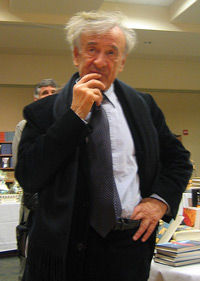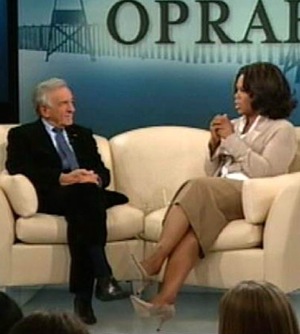Night #1 and Night #2—What Changes were Made and Why, Part Two
By Carolyn Yeager
Elie Wiesel questioned in a California courtroom in 2008:
Q. And is this book Night that you wrote a true account of your experience during WWII?
A. It is a true account. Every word in it is true.
 Elie Wiesel mans his table at a Jewish book fair in Austin TX in 2006. This was the year the new translation of Night by wife Marion came out, and Oprah Winfrey selected it for her book club.
Elie Wiesel mans his table at a Jewish book fair in Austin TX in 2006. This was the year the new translation of Night by wife Marion came out, and Oprah Winfrey selected it for her book club.
In Part One, I established that the decision to rebrand Night into an autobiography was the reason for the new translation, in which necessary changes could be made to better 'fit' the story both to the real Elie Wiesel and the known facts of the Hungarian deportation.
An excerpt from the article re the liberation of Buchenwald:
In a November 2000 interview with Oprah Winfrey, Wiesel recalled:
 … and we [children] were left until the end. But every day we marched to the gate anyway. I was near the gate more than five times before I was released, and each time, the gate closed just before I came to it.
… and we [children] were left until the end. But every day we marched to the gate anyway. I was near the gate more than five times before I was released, and each time, the gate closed just before I came to it.
Ah, we have heard this before, haven’t we? As exaggerated as it sounds, in the Yiddish original Un di velt hot geshvign the author goes even further. He writes:
I didn’t even bother to try hiding myself. Let myself be born along with the stream. Tens of times I stood before the iron camp gate, on the threshold of death, and always something happened which brought us back to the block.
Un di velt continues: “If I was not killed then it is merely thanks to almighty chance. For — because of the hunger, I even wanted to go to the gate: outside the gate, they were distributing bread and marmalade.”
* * *
Liberation brings Freedom and Revenge
Un di Velt, P 244: The first gesture of freedom: the starved men made an effort to get something to eat. They only thought about food. Not about revenge. Not about their parents. Only about bread. And even when they had satisfied their hunger—they still did not think about revenge.
Night, P 115: Our first act as free men was to throw ourselves onto the provisions. We thought only of that. Not of revenge, not of our families. Nothing but bread.
Oprah Winfrey interview: Oprah asks, “After you were liberated, what did you do?” Wiesel answers: “The first thing many of us did was reassemble to say a prayer for the dead.” (page 5)
There is much more. Continue reading at Elie Wiesel Cons The World
Category
Elie Wiesel, Holocaust Revisionism- 1110 reads









